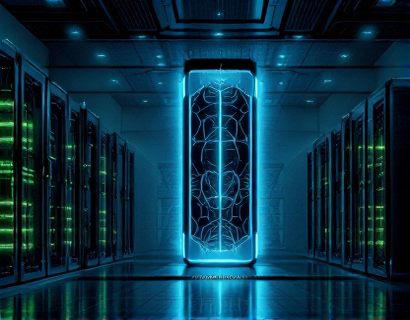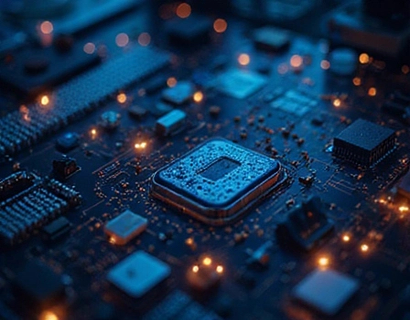Blockchain-Enabled Registry Software: Revolutionizing Data Management
In an era where data is the new currency, the need for robust, secure, and efficient data management solutions has never been more critical. Traditional registry management systems often struggle with issues such as data integrity, security, and transparency. Blockchain-enabled registry software emerges as a transformative solution, offering enhanced security, transparency, and efficiency. This article delves into the intricacies of how blockchain technology is revolutionizing data management, providing a comprehensive look at the benefits and applications for professionals in registry management, data security, and digital transformation.
Understanding Blockchain Technology
Before exploring the applications of blockchain in registry management, it's essential to understand the fundamental principles of blockchain technology. At its core, a blockchain is a decentralized digital ledger that records transactions across multiple computers in such a way that the registered transactions cannot be altered retroactively. This technology ensures that once data is recorded, it is immutable and transparent, providing a high level of trust and security.
Blockchain operates on a network of nodes, each maintaining a copy of the entire ledger. When a new transaction occurs, it is broadcast to the network, and a group of nodes, known as miners, verify the transaction through complex computational puzzles. Once verified, the transaction is grouped with other transactions in a block, which is then added to the chain, hence the name blockchain. This process, known as consensus, ensures that all nodes agree on the state of the ledger, making it highly resistant to tampering and fraud.
Enhanced Security through Blockchain
One of the most significant advantages of blockchain-enabled registry software is its enhanced security features. Traditional registry systems are often centralized, making them vulnerable to cyber attacks, data breaches, and unauthorized access. In contrast, blockchain's decentralized nature distributes data across a network of nodes, eliminating a single point of failure.
Each block in the chain contains a cryptographic hash of the previous block, creating an unbreakable link. Any attempt to alter data in a block would require changing all subsequent blocks, which is computationally infeasible due to the consensus mechanism. This makes blockchain an ideal solution for securing sensitive data in registries, ensuring that records remain tamper-proof and authentic.
Transparency and Traceability
Transparency is another cornerstone of blockchain technology. In a blockchain-based registry, all transactions are recorded in a public ledger that is accessible to all participants. This transparency ensures that every change or update to the data is visible and traceable, fostering trust among stakeholders. Unlike traditional systems where data modifications may go unnoticed, blockchain provides a clear audit trail, making it easier to track the history and provenance of data.
For registry management professionals, this level of transparency is invaluable. It allows for real-time monitoring of data changes, reducing the risk of errors and fraud. Regulatory bodies can also benefit from this transparency, as they can verify compliance and ensure that all records are accurate and up-to-date.
Efficiency and Automation
Blockchain technology not only enhances security and transparency but also improves the efficiency of registry management processes. Smart contracts, self-executing contracts with the terms directly written into code, can automate routine tasks and workflows. For instance, in property registry management, smart contracts can automatically update ownership records when a property transfer is completed, eliminating the need for manual interventions and reducing processing times.
Automation through blockchain reduces the likelihood of human error and speeds up processes, leading to increased productivity and cost savings. Organizations can focus on higher-value tasks while routine operations are handled seamlessly by the blockchain system.
Use Cases in Registry Management
The applications of blockchain-enabled registry software are diverse and far-reaching. Here are some key use cases across different sectors:
- Property Registries: Blockchain can streamline property ownership and transaction records, reducing fraud and improving accuracy. Smart contracts can automate the transfer of property rights, ensuring that all parties adhere to the agreed terms.
- Identity Verification: In a world where identity theft is a significant concern, blockchain-based identity management systems can provide secure and verifiable digital identities. This is particularly beneficial for governments and organizations that need to authenticate individuals for various services.
- Supply Chain Management: Blockchain can enhance transparency and traceability in supply chains, ensuring that products are authentic and ethically sourced. Each step in the supply chain, from production to delivery, can be recorded on the blockchain, providing a clear and immutable record.
- Health Records: Patient health records can be securely stored and managed using blockchain, ensuring that medical information is accurate, up-to-date, and accessible only to authorized personnel. This improves patient care and compliance with regulations such as HIPAA.
- Voting Systems: Blockchain-based voting systems can increase the integrity and transparency of elections. Votes can be recorded on the blockchain, making it nearly impossible to alter or manipulate the results.
Challenges and Considerations
While the benefits of blockchain-enabled registry software are clear, there are several challenges and considerations that organizations should be aware of:
First, the technology is still relatively new, and there is a learning curve associated with implementing blockchain solutions. Organizations may need to invest in training and development to ensure their teams are proficient in blockchain technology.
Second, scalability remains a concern. While blockchain is highly secure, it can be slow and resource-intensive, especially when handling a large volume of transactions. However, ongoing developments in blockchain technology, such as sharding and layer 2 solutions, are addressing these scalability issues.
Third, regulatory compliance is crucial. Different regions have varying regulations regarding data privacy and security. Organizations must ensure that their blockchain-based registry solutions comply with local and international laws, such as GDPR in Europe.
Future Trends and Innovations
The future of blockchain-enabled registry software looks promising, with several trends and innovations on the horizon:
First, the integration of blockchain with other emerging technologies, such as the Internet of Things (IoT) and artificial intelligence (AI), can further enhance data management capabilities. For example, IoT devices can generate and record data on the blockchain, ensuring that sensor readings and device interactions are secure and verifiable.
Second, the development of private and consortium blockchains is addressing some of the scalability and privacy concerns associated with public blockchains. These tailored solutions offer the benefits of blockchain while providing more control over the network and data access.
Third, the rise of decentralized applications (dApps) built on blockchain platforms can revolutionize how registry management is conducted. dApps can provide user-friendly interfaces for interacting with blockchain-based systems, making them more accessible to non-technical users.
Conclusion
Blockchain-enabled registry software represents a significant leap forward in data management, offering enhanced security, transparency, and efficiency. By leveraging the unique properties of blockchain technology, organizations can transform their registry processes, build trust, and comply with regulatory requirements. As the technology continues to evolve, the potential applications and benefits will only grow, making it an essential tool for professionals in registry management, data security, and digital transformation.










































